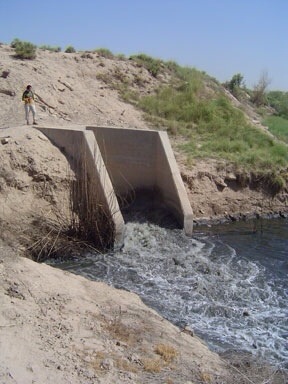The Diyala River forms a natural border between Iran and Iraq for around 20 miles. It flows from Iran’s Zagros Mountains into eastern Iraq and joins the Tigris near Baghdad.
Now researchers from the University of Salford have published a study which shows that the flow of fresh water to Iraq via the Diyala River has been depleted by man-made regulation at its source in Iran, and have called for a treaty to protect Iraq’s water supply.
The authors of the study, Furat Al-Faraj and Professor Miklas Scholz, from the School of Computing, Science & Engineering at the University, believe that the situation will worsen in 2018 when the Darian dam and the Nasoud water transfer tunnel (currently under construction in Iran) become operational.
The new research shows that there has been a sharp shift in the flow of the Diyala during the last 15 years which cannot be attributed to climate change and dry spells alone.
The reduction correlates with the building of dams, large-scale irrigation schemes, fish farms, and the industrial and municipal use of water upstream in Iran, causing the dwindling of the river’s flow into Iraq.
Several dams, including the Khan Gorge, near the Iranian frontier, divert water for flood control, hydroelectric power, and the irrigation of wheat, rye, cotton, rice, and tobacco in the lower valley.
Between 1999 and 2013, the reduction in the flow of the river in Iraq ranged from about 26% to nearly 82%. There was also a significant reduction between 1983 and 1998, when a lower level of regulation began upstream in Iran.
The rapid increase in the depletion of rivers will lead to a major man-made water crisis in Iraq, ultimately threatening human life and the environment. Water will become scarce and too expensive, while food prices will increase significantly due to higher irrigation costs.
Professor Scholz has therefore called for a water treaty to be put in place and has urged the international sharing of data, but the current instability of the region could make this extremely difficult to achieve.
Professor Scholz said: “A political solution to the management and sharing of sustainable water resources between Iran and Iraq has been unfeasible in the past. This was due to the legacy of the Iraq-Iran war and the different branches of Islam, which governed the two countries.
“The formation of a new Iran-friendly government in Iraq has made new talks possible, but the negotiations have been threatened by the outbreak of civil war. Our research shows that Iraq’s fresh water supply has already been considerably depleted, so it is essential that these talks continue.
“The ultimate aim must be the negotiation and implementation of a water treaty, which will meet the needs of Iraq’s people.”
The Journal of Hydrology paper can be downloaded from the Science Direct website at http://www.sciencedirect.com/science/article/pii/S0022169414003850.







